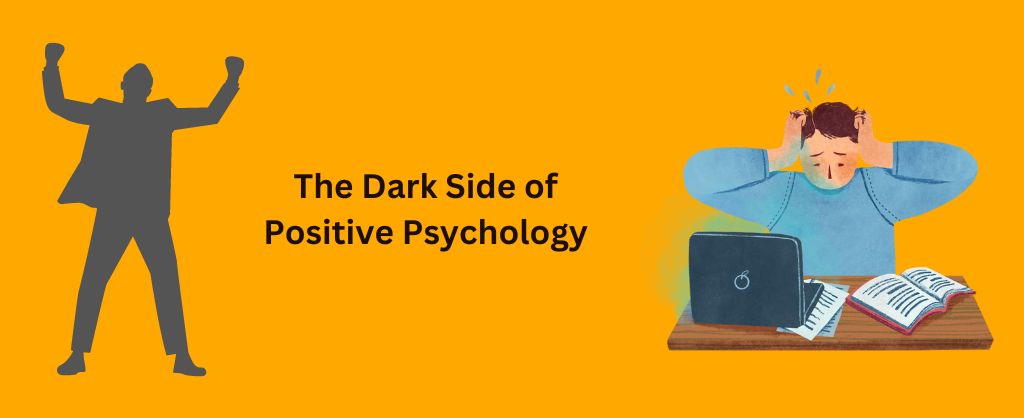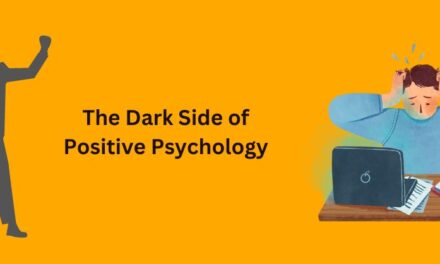The Dark Side of Positive Psychology

Positive psychology is a field of study that focuses on human strengths, virtues and wellbeing. It became popular in the late 1990s because it aimed to understand how people can live fulfilling lives.
But in recent years, some concerns have come up about whether positive psychology has placed too much emphasis on positivity. Some researchers now think this may have unintended negative effects.
Topics Covered in This Article
- The Basics of Positive Psychology
- Toxic Positivity in the Workplace
- Finding a Healthy Balance of Positivity
- Signs Positivity Has Become Toxic
- Ways to Foster Healthy Positivity
- Conclusion
The Basics of Positive Psychology
To understand the potential dark side of positive psychology, it is helpful to first review the basic aims and practices of this field.
Positive psychology was founded largely through the efforts of psychologist Martin Seligman. He pushed back against psychology’s traditional emphasis on studying mental illness, dysfunction and distress.
Seligman advocated that psychology should also focus on human virtues, strengths and wellbeing. This gave rise to the field of positive psychology.
Some key topics studied by positive psychologists include:
- Happiness and life satisfaction
- Character strengths and virtues
- Positive emotions like joy, gratitude and awe
- Hope, optimism and resilience
- Flow states and mindfulness
- Positive relationships and social connections
Positive psychology also involves studying interventions and practices aimed at cultivating human thriving. This includes exercises to boost positive emotions, build resilience and foster post-traumatic growth.
Overall, the intent has been to balance psychology’s emphasis by gaining a fuller understanding of human potential and wellbeing. But there are concerns this comes at a cost.
Criticisms of the Positivity Culture
In recent years, a body of research has emerged critiquing the positivity culture that has arisen around positive psychology.
Some argue this overemphasis on positive thinking puts unreasonable pressures on people. Widely promoted mantras like “good vibes only” imply people should ignore or suppress any negative emotions.
Potential downsides to an excessive positivity focus
- Denying unpleasant realities
- Discouraging negative emotions
- Blaming individuals for not being positive
- Downplaying serious problems
- Toxic positivity in the workplace
- Unrealistic expectations
- Spiritual bypassing
- Victim blaming
Essentially, the argument is that too much positivity can at times be detrimental, unethical and promote the denial of real problems.
A balance is needed between positive and negative psychological states.
Positivity Culture Can Deny Unpleasant Realities
One major concern is that an extreme emphasis on positivity leads people to deny unpleasant realities and serious problems instead of dealing with them.
Constantly thinking positive thoughts, ignoring negative emotions and avoiding difficult situations can take a toll on mental health.
People may end up feeling like failures when they cannot maintain a continuously upbeat state of mind.
For example, telling someone with depression to “think positively” without acknowledging their real suffering can be both ineffective and minimizing. Problems like poverty, discrimination and abuse also cannot be overcome through positivity alone.
Related: When is it inappropriate to give a pep talk?
Positive psychology should empower people to confront challenges, not merely pretend everything is fine.
The darkness has to be seen clearly in order to bring in the light.
Discouraging “Negative” Emotions Backfires
Positive psychology has also been critiqued for the way its teachings can discourage people from feeling emotions culturally deemed as “negative,” like sadness, fear, anger, guilt or shame.
But research shows even unpleasant emotions serve an adaptive purpose and can motivate positive change. Blocking them out rather than processing them in healthy ways can backfire.
For instance, grief over a loss is painful but helps people adjust to changed life circumstances. Feeling guilty over wrongdoing motivates people to make amends and become better. And anger over injustice fuels social activism.
While prolonged negative emotions are unhelpful, experiencing a range of human emotions is natural and useful.
Teachings that shame people for normal negative feelings can do harm.
Individuals Blamed for Lack of Positivity
Some argue the positivity culture around positive psychology leads to blaming individuals for not feeling happy or thinking positively enough. But circumstances outside a person’s control have huge impacts on wellbeing.
Factors like poverty, disability, abuse, trauma, systemic inequality and lack of access to healthcare can understandably engender negative states. While positive practices can help, they will not instantly resolve these complex issues.
Yet the excessive individualistic focus of positive psychology can sometimes hold people personally responsible for conditions caused by social, political and economic forces.
This “victim blaming” approach is unproductive and unethical.
More focus should be placed on addressing societal conditions that give rise to misery, despair and anger. Positive institutions and policies are needed, not just changes in personal mindset and behavior.
Toxic Positivity in the Workplace
Another area of concern is how positivity culture perpetuates unhealthy dynamics in workplaces and organizations.
Toxic positivity manifests when managers and leaders pressure employees to maintain upbeat attitudes even at unreasonable times. Some workplaces expect nonstop enthusiasm, gratitude and optimism from workers no matter how stressful or abusive conditions become.
This forces employees to suppress valid criticisms, concerns and negative feedback regarding the workplace. Toxic positivity provides cover for those in charge to avoid accountability.
It prioritizes appearances over addressing real problems.
Ideally, positive psychology principles would help transform negative work environments. But instead, positivity is sometimes wrongly used against employees for the benefit of corporations.
Unrealistic Expectations Set People Up for Failure
Critics also argue the positivity movement and positive psychology create perfectionistic, unrealistic expectations that most people cannot fulfill.
Positive psychology often focuses on extraordinary individuals who demonstrate virtues, strengths, and character values at admirable levels. But for average people, the standards are set impossibly high.
When flawless happiness, constant gratitude, unbreakable resilience and peak performance are set up as norms, most people unsurprisingly fail to meet these ideals.
This perfectionism and magical thinking around positivity can erode self-esteem.
People feel like failures when they do not live up to the exaggerated positivity of Instagram influencers, life coaches and self-help gurus promoting positive psychology concepts. But their lives behind the curtain are rarely as perfect as presented.
Spiritual Bypassing and Victim Blaming
Some disciplines influenced by positive psychology, like the New Thought movement, have been accused of promoting “spiritual bypassing.” This refers to using spiritual practices to avoid dealing with painful realities.
For example, telling someone experiencing poverty to “manifest wealth through cosmic ordering” does nothing to address societal injustice. But it enables those with privilege to place responsibility on the victim rather than advocating for economic equity.
Similarly, telling chronically ill people they can “heal themselves with positive energy” leads to victim blaming when they are not magically cured.
Not everyone can instantly overcome all hardships by thinking positively.
Positive psychology should empower gradual progress on problems, not peddle false hope through spiritual bypassing. Otherwise, those already victimized will only be further harmed.
Finding a Healthy Balance of Positivity
Positive psychology clearly provides science-backed benefits when applied ethically. But in the popular positivity culture it helped spawn, these concepts are often taken to extremes with detrimental effects.
Most agree a healthy balance of positivity, negativity and realism is needed. Positive emotions serve a function, but so do unpleasant emotions that can motivate positive change.
The aim should not be to banish negative states, but to cultivate skills for dealing with life’s ups and downs. Challenging circumstances cannot all be overcome through individual positivity. Societal change is needed.
Positive psychology has helped shift psychology’s emphasis to human thriving. But to prevent harms from positivity culture, the field must stay grounded in ethical principles, nuance, transparency and responsible teaching.
With a balanced approach, positive psychology can continue empowering people to build happiness, hope and meaning even within an imperfect world.
Signs Positivity Has Become Toxic
How can you tell when a positivity practice, mindset or teaching has crossed over into toxic territory?
Watch out for these warning signs:
- Claiming people directly control all circumstances with their thoughts
- Shaming natural negative emotions as undesirable
- Pretending injustices and problems do not exist
- Blaming victims of trauma or oppression for not being positive
- Pushing magical thinking, perfectionism and false hope
- Rejecting science and evidence that contradicts harmful positivity
- Demonizing any expression of pain, grief, anger, doubt, etc.
- Refusing to address root causes and shifting responsibility solely to the individual
- Using positivity to manipulate, exploit or silence people
- Profiting off giving inadequate or misleading positive advice
Positivity becomes pathological when it harms more than it helps. Any philosophy taken to an irrational extreme can turn toxic. With self-awareness, even misguided teachings can provide lessons in developing healthier perspectives.
Ways to Foster Healthy Positivity
How can people apply the benefits of positive psychology in a balanced way that acknowledges life’s challenges? Here are some recommendations:
Accept and allow all emotions: Don’t suppress sadness, anger or fear. Process them in a healthy way to learn and grow.
Check perfectionistic expectations: Don’t expect constant joy and peak performance. Forgive yourself for being human.
Focus on progress over perfection: Set realistic goals to build towards. Even small gains are victories.
Don’t minimize others’ pain: Show compassion to those struggling. Don’t invalidate their suffering. Offer support.
Examine your privilege: Acknowledge how social status, wealth, health, and identity impact your positivity. Empathize with those less fortunate.
Question toxic teachings: Reject any positivity philosophy that shames natural emotions, victim blames or exploits people.
Address causes, not just symptoms: While positive practices help, also push for societal reforms to fix injustice.
Find purpose beyond pleasure: Build meaningful directions for your strengths to serve greater good, not just personal happiness.
Conclusion
Positive psychology clearly provides scientifically proven benefits when applied in an ethical way. But in pop culture positivity, these ideas often go too far and can be harmful.
Most agree people need a balanced mix of positive thinking, negative emotions and realistic views. The goal should be gaining skills to handle life’s ups and downs, not banishing all negative feelings.
Positive psychology should empower gradual progress on problems, not offer false hope through magical thinking.
With a balanced approach, positive psychology can help people build happiness, hope and meaning even when life is hard. But too much positivity can have a dark side when taken to extremes.












